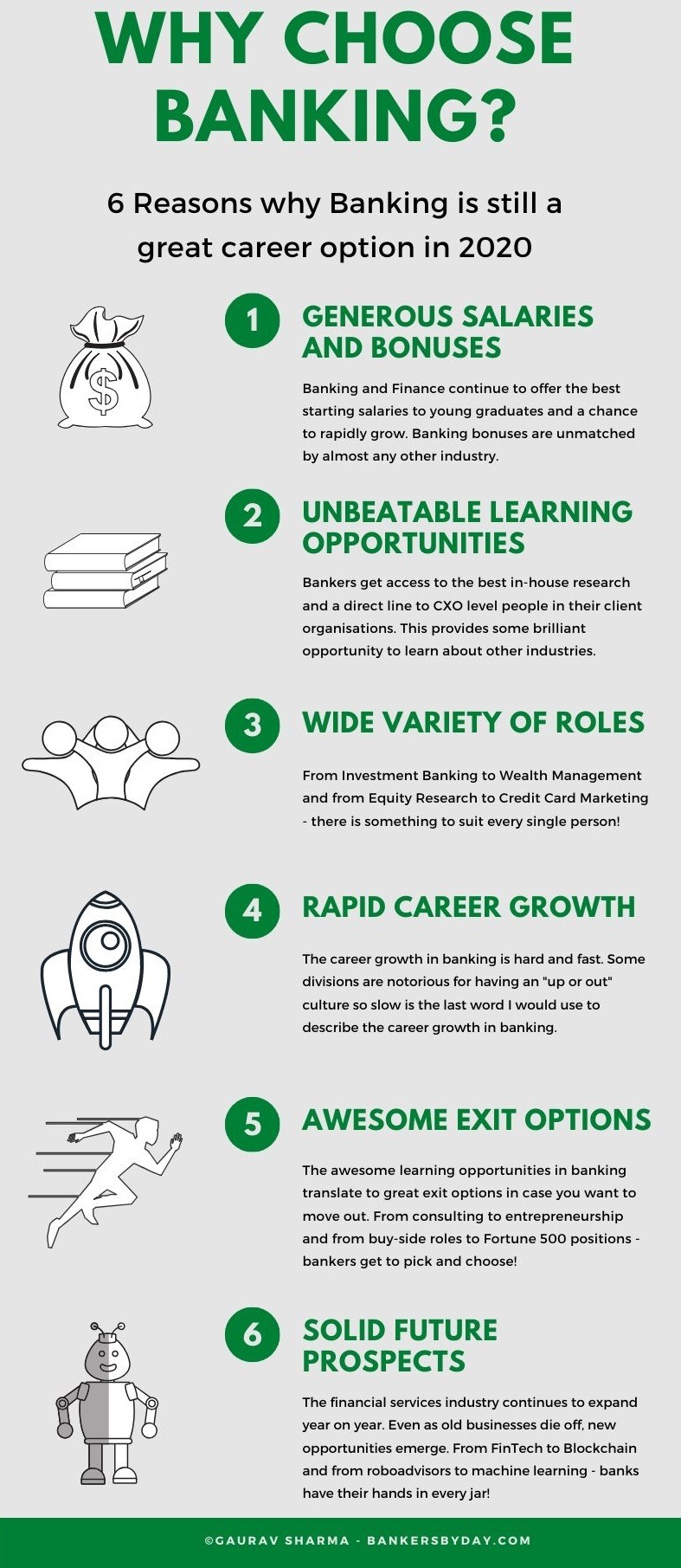Banking continues to be one of the most challenging, competitive and rewarding careers in the corporate world. It offers an unmatched opportunity to learn about other industries and businesses, some of the best options for career growth and unbeatable exit options.
Even as some roles have fallen from grace due to the excesses of the past, other opportunities continue to emerge. FinTech and tech enables finance is increasingly on the rise with hundreds of billions at stake. And banks need someone to manage all that. If you are a tech savvy finance guy/ gal – that’s one of the best career combos anywhere these days.
1. Generous Compensation
Everyone has certain expectations from their jobs – some people would give anything for great work-life balance, some prefer the opportunity to learn while some just like to travel. But at the end of the day, the one thing that is common about all jobs is that you have to be making some money while doing it.
When it comes to compensation, banking has earned a well-deserved reputation for paying better than most other corporate jobs. Analysts with 0-3 years of experience make anything from USD 80,000 to USD 200,000. This depends on factors like the division they are working for, the size of the bank and location. If you have an MBA, you can increase those numbers by around 50% for just your starting salary.
Sales & Trading, M&A, Corporate Banking, Capital Markets roles offer the best bang for your buck in the first 3-4 years of your careers. After that though, it greatly depends up to how much money you bring in for your employer. And this is the stage where roles with the maximum revenue potential (like Trading, Private Equity, Venture Capital and Hedge Funds) really begin to shine.
These are the best paying jobs in banking, but that’s not to say that retail banking and support functions don’t pay well. They are still well-above averages for other sectors, especially if you are a high performer.
2. Valuable Business Skills
You learn something at every job. Banking is not so different in that respect. You learn about your job, you learn how to sell, you learn about the various products and services and how they work. Same old stuff.
But that is where the similarities between banking and almost all other jobs end. Because in banking you not only have to learn about your own industry but about the client’s as well. You have a client in the telecom sector that you want to lend a billion dollars to? You better learn every single thing there is to learn about the client, their competitors, the threats to their industry, their growth prospects and so on. And with a billion dollars of the bank’s money on the line, you better make sure you know more than anyone else on the planet (and that sometimes includes the client as well).
Over time, bankers will learn a lot about the various industries that they cover. Sure, management consultants do this too, but their area of specialisation is usually restricted to one particular sector. As a banker, you can move from telecom to auto to even eCommerce over the course of your career.

3. More than one way to get in
There are a LOT of different ways to get into banking. In our article on the best degrees for banking, we look at just a few of the many academic courses that can help you get into banking.
I have seen MBAs, engineers, economists, physicists, lawyers and even doctors and fighter pilots in banking. It’s just an interesting and competitive career which appeals to a lot of demographics.
There are also a lot of opportunities to take the unconventional path – I have seen customer service reps in call centres and even door to door salesmen make it big in banking. It’s rare and getting rarer these days, but I bet you already know what they about those that have the will to succeed.
4. Something for everyone
Are you a math geek? A super salesman? A rock under pressure? A legal genius? An economics savant? There is something for everybody in banking.
Here are just a few of the roles I have covered on BankersByDay:
4.1. Investment Banking
4.2. Corporate Banking
- Credit Analysis
- Relationship Management
- Project Finance
- Supply Chain Finance
- International Trade Finance
4.3. Investment Management
- Private Equity
- Hedge Funds
- Venture Capital
- Asset Management
- Equity Research
- Quants/ Financial Engineering
4.4. Retail Banking
4.5. Back office roles
5. Excellent Career Progression
The articles listed above break down the career choices and paths for each role. However, here’s a general breakdown of how things go:
5.1. Natural Growth
This is the best option for most banking divisions as you keep building expertise in your domain and thus become more valuable over time. You start out as an Analyst (or as an Associate post MBA) and move up the chain over the years. From Associate, you move up to AVP/ Vice President/ Associate Director, then to full Director and finally Managing Director and the various CXO roles.
You don’t have to be in the same bank for this, you just have to be in the same vertical. In fact, having the flexibility to shift from one bank (and/ or location) to another is actually a great career advantage and you can boost both your compensation and your responsibilities with such lateral movements.
5.2. Lateral movements
Certain personality types get bored of doing the same thing and prefer to keep switching things up from time to time. You can do this in banking as well to quite an extent. Certain roles allow more flexibility than others and it all depends on how many skills are transferable between the roles.
For example, if you have front-end client experience, you will do just fine in almost any sales roles. Similarly, 10-15 years of solid experience in most roles will allow you to become an independent financial consultant if you so choose. Some bankers just end up setting up their own funds or creating their own FinTech startups.
6. Stellar Exit Options
Banking has some of the best exit options in the corporate world. You build up a lot of core skills like analysis, logical reasoning, relationship management, industry knowledge, people and time management etc. You also gain a lot of knowledge about other industries as you spend a lot of time with your clients. Here are just a few of the great exit options for bankers:
6.1. Private Equity/ Hedge Funds/ Venture Capital
This is the ultimate goal of many IB analysts which is why they happily put in 80 hour weeks with a smile on their faces. There is some good money to be made if you can get your foot in the door of some prestigious buy side setup. Not everyone gets in though and most burnout before getting there. But for many, this is the promised land!
6.2. Start your own consulting practice
Finance is a massive and evergreen industry and there are hundreds of thousands of big and small companies who could always use some expert advice on their products or messaging and so on. This option is obviously not for everyone, since its like running a solo business. But I guess I am biased towards it because it worked out really well for me.
6.3. FinTech, RegTech, WealthTech etc.
This is something I have been trying to do as well but it is a lot more work than I had initially anticipated. It’s also a bit capital intensive to hire programmers etc. to build the product and then pitch them to prospective clients. But its something I have always kept an eye on and I am sure there are people much more resilient than I am who can make this work.
6.4. Entrepreneurship
Moving into a hot new start-up as their finance guy is always a great option. The real draw of this option is that you end up handling a lot of their finance stuff which can be really exhilarating. You set up the budgeting, the financial planning, the banking tie-ups, the subsequent fund-raising rounds etc. Expect to receive at least a small stake in the company and if it skyrockets, you are a millionaire! If it doesn’t work out, move on to the next start-up.
6.5. Corporate Finance
I have seen my fair share of CFOs in Fortune 500 companies who were ex-bankers. It’s usually a much easier and laid-back lifestyle and the stress levels are generally a lot lower. The money might not always be as good at the lower levels, but you usually end up in the more senior level positions anyway. Plus, you get stock options!
7. Tech-enabled Future
Cryptocurrencies are often thought of as something that would end the traditional world of finance. But the truth is that they won’t. Because banks are now embracing blockchain tech themselves and building solutions with massive budgets and expertise from tech companies.
And then you have Artificial Intelligence that represents the next epoch in terms of how business will be done. Banks again are some of the biggest investors in AI and machine learning. For those willing to embrace new ideas and technologies, the career opportunities in banking and finance is higher than ever.
You can read more about this in the article on FinTech careers here.
8.2. Online Certifications
Here is a small, curated list of the best online courses, certifications and degree programs to help you get started in banking & finance.
Related Articles
- Financial Modeling Courses
- Risk Management Courses
- Excel/ VBA Courses
- Business Analytics Courses
- Portfolio/ Asset Management Courses
- Forex Trading Courses


